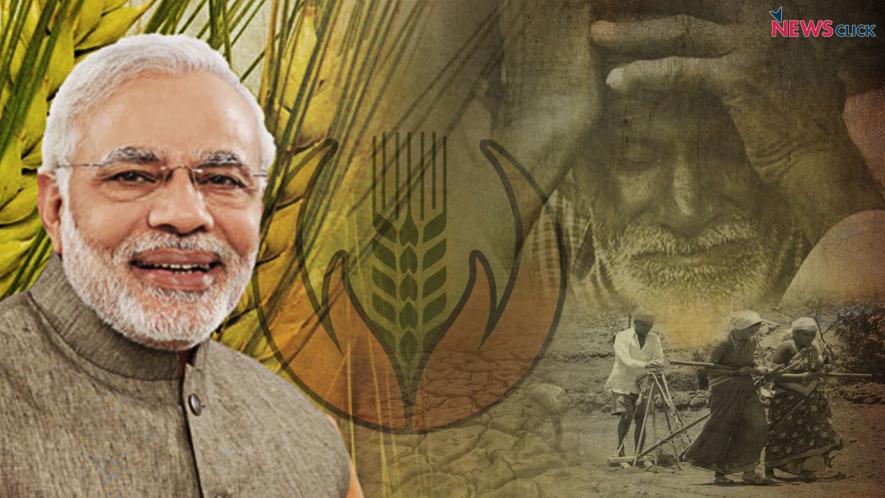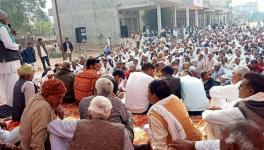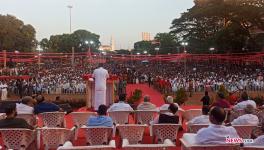Fasal Bima Yojana: Farmers’ Distress is Source of Profit for Companies

Among the series of schemes launched (or repackaged) by the Narendra Modi-led National Democratic Alliance government, one of the most toxic is the Pradhan Mantri Fasal Bima Yojana (PMFBY). Its purpose is to provide crop insurance to farmers, that is, if the crop fails due to some non-preventable reason, such as weather calamity etc., then the farmers will be compensated for this loss. The principle is sound – the government should take care of such losses which are very common in India since cultivation is largely dependent on monsoon rains.
What the Modi government did was to turn loss and distress of farmers into a profit-making enterprise. This happened through a well-established mechanism of insurance, a favoured model of the Modi government. In this model, which is being imposed on the healthcare system also through Ayushman Bharat, the government abdicates its own responsibility of providing a service and hands it over to companies. What could have been a straight forward service of compensating farmers for losses turns into government money being handed over to companies that dole out compensation and make enormous profits from it.
How PMFBY Works – Govts Paid Rs.34,859 Crore to Companies!
Farmers pay an amount to the insurance companies as premium. This is usually between 1.5% to 5% of the total premium expected. The rest is paid equally by the Central government and the various state governments. The total (or gross) premium thus collected goes into the coffers of the insurance companies. After the harvest, if a farmer suffers loss of crops due to natural calamities, then he or she is given compensation by the company from the gross premium that it had collected.
The scheme was inaugurated in 2016. Since then, three kharif seasons and two rabi seasons have been completed and we are now in the third rabi season. Information about how much premium was collected and how much compensation given out is available only till kharif 2017.
As can be seen from the chart above, for kharif 2016, rabi 2016-17 and kharif 2017, the total premium collected by 18 insurance companies was a staggering Rs 42,114 crore. This was made up of farmers contribution (amounting to Rs. 7,255 crore or just over 17%) and government’s share (Rs. 34,859 crore or nearly 83%). The governments’ share is made up of equal contribution by the Central and state governments.
The insurance companies paid out Rs.32,912 crore as compensation. That means they were left with about Rs.8,713 crore as surplus.
As you can see, it is a scam of monumental proportions. What the government could have done directly (paying farmers for crop losses) is now being handed over to insurance companies and they are – expectedly – taking a huge commission or cut out of it. These companies have kept nearly 21% of the money in their pockets. It is the same money that suffering farmers had paid out as premium or the government’s money which is ultimately derived from the people.
The Centre itself has spent about Rs.33,489 crore in the three years since this scheme was started (Table 2). This is not going toward premium subsidy alone. The premium subsidy share of the Centre is about Rs.21,000 crore because it has to bear 50% share only with the other half coming from state governments. So, why this additional amount of about Rs.12,000 crore? Part of it is liabilities clearance from before 2016, and part is the administration cost.
Average Compensation Per Farmer – Just Rs.11,805
Compensation to farmers is determined by a complicated process that is largely run by state govternments – not by the insurance companies. So, the cost of this is borne by state governments even though insurance companies are getting all the profits.
To find out how much compensation is to be paid, Crop Cutting Experiments (CCEs) are carried out across the country. In each season, some 15-20 lakh such CCEs are conducted. In each such CCE, a sample plot is selected and in the presence of various local officials and company representatives, the crop is cut and measured. This is compared with the average of the past seven years to determine the loss. Surveys have found a huge number of lacunae in CCEs with primitive methods of assessment. This leads to less compensation for farmers.
According to IIM-Ahmedabad survey for evaluation of PMFBY, on an average, each farmer got just Rs.11,805 as compensation in 2016-17 (kharif and rabi combined, across all states).
Delays in Compensation Payment
Widespread complaints of delays in claim settlement and receipt of payment have been reported right from the first season when PMFBY was implemented. Delays of as long as three to four months were common. This is catastrophic for the farmers who have suffered losses because they need the money to start their next season’s preparation immediately. Any delay forces them into the clutching arms of money-lenders, who charge exorbitant rates. This was precisely the reason that there was need for speedy compensation after crop losses, and it was touted as a big advantage of the PMFBY. Yet, two years of implementing experience shows that this problem has not been resolved.
Why are there delays? An investigation done later has revealed that there were several factors behind the delays, including absence of company representatives at the CCEs leading to the company filing objections to the claimed amount (including court cases!), delay in transfer of subsidy amount by state governments and delays at the bank level. All of this arises from the involvement of companies in the process.
The myth that it is only government bureaucracy that delays payments has been blown apart by the PMFBY experience. Insurance companies themselves cause as much delays. This is not surprising because they are in the game only for making profit, not for farmers’ welfare. So, they try to create as many obstacles as possible in the process of making payments of claims. This is a characteristic that all insurance companies all over the world share.
Farmers Disillusioned With PMFBY
In view of all these problems – low compensation, delayed payment, rejection of claims, increasing premium costs – farmers have voted with their feet. Starting with over four crore insured farmers in its first season (kharif 2016), the coverage dipped to 3.47 crore in kharif 2017 and is provisionally estimated at 3.33 crore in this years’ kharif season. That’s a drop of 70 lakh farmers or 17% of the starting point, in two years, just for the kharif season. (See Chart) In the rabi seasons, the drop is much lower at about 10,000 fewer farmers in 2017-18 compared with 2016-17.
One aspect that needs mention here is the nature of enrolment in the scheme. All the farmers who take loans from banks have to compulsorily enrol and get insurance coverage. Field studies have shown that banks get the loan taking farmer to sign a consent form at the time of disbursement. This is what has artificially propped up the numbers in PMFBY.
With passing time, this forced enrolment is cracking up. There are reports that farmers sign up – they have no option – when taking a loan, but shy away from paying the insurance premium. Also, with the banking system itself in crisis and credit flow to farmers slowing down, the number of loanees has not increased so much, hence the dip in insured farmers numbers.
What Should Be Done
PMFBY has turned out to be a massive conspiracy to suck out farmers’ hard-earned money and also government’s funds (which are also public money) and hand it over to insurance companies for nothing. This has left farmers without adequate compensation for crop losses due to weather hazards, failure of monsoon, pest attacks etc. It is the duty of the society as a whole to compensate farmers for such losses and the elected government should undertake this important responsibility directly itself.
Making profits running into hundreds of crores of rupees out of farmers’ distress may be PM Modi’s idea of how to run the country, but it flies against all morality and principles of justice. PMFBY should be scrapped forthwith and a robust government-run compensation system established.
Get the latest reports & analysis with people's perspective on Protests, movements & deep analytical videos, discussions of the current affairs in your Telegram app. Subscribe to NewsClick's Telegram channel & get Real-Time updates on stories, as they get published on our website.
























